The Eiffel Tower is the symbol of Paris and one of the most visited monuments in the world. It was built between 1887-1889 to celebrate the centenary of the French Revolution and to demonstrate France’s industrial power.
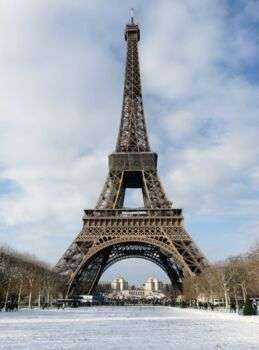
Image source: https://search.creativecommons.org/photos/15812d69-9556-4557-a832-701da908c587 by karlnorling
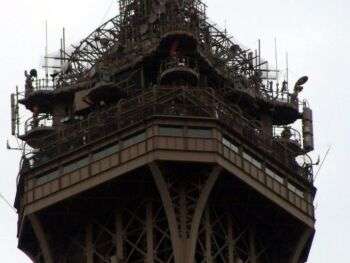
Image source:https://search.creativecommons.org/photos/464c0ab3-09dc-439a-886a-6a1a63880d7a by Thomas Claveirole

Image source:https://search.creativecommons.org/photos/88fc9477-d9d8-434a-8b59-cad40a4ecb09 by Rogue Bacon
History and Construction
The Eiffel Tower takes its name from the engineer Gustave Eiffel but was designed by his senior engineers Maurice Koechlin and Emile Nugier. Eiffel sent the engineers to the head of his company’s architectural department, Stephen Sauvestre. With Sauvestre’s edits, Eiffel supported the final plans and bought the patent rights. The tower was built in two years (from 1887 to 1889) just in time for the Universal Exposition. However, not everyone was satisfied. Several prestigious artists and intellectuals of the time decided to mobilize to block its construction but the foundations were completed very quickly. Aware of the historical significance of his Tower, in 1887 Eiffel engaged the photographer Edouard Durandelle to document the work in progress of the Tower.
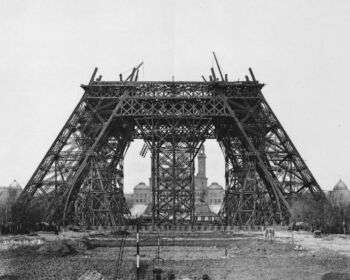
Image source: https://en.wikipedia.org/wiki/Gustave_Eiffel#/media/File:Construction_tour_eiffel3.JPG
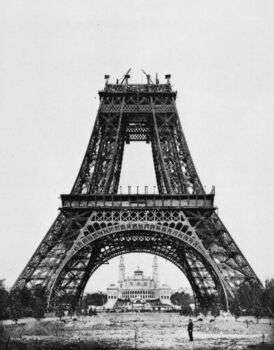
Image source: https://en.wikipedia.org/wiki/Gustave_Eiffel#/media/File:Construction_tour_eiffel5.JPG
In 1889, Eiffel was able to complete its construction just in time for the Universal Exposition. It was inaugurated on March 31st, 1889, and officially open to the public. Initially, Eiffel had been allowed to leave the Tower standing for only 20 years, but given its usefulness for communication reasons and as a laboratory for scientific studies, he was permitted to leave it standing.
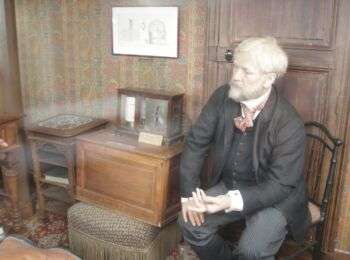
Image source: https://search.creativecommons.org/photos/4aabd7ed-36fb-4047-8311-f341030ff094 by Aniket Mone
Design and data sheet
The French capital’s most precious landmark has an impressive iron structure of 324 meters high. The only material used for the construction of the Eiffel Tower is the wrought iron that was erected in the shape of a cross in more than 18,000 pieces, fixed together with about 5,000,000 bolts. Its design was firstly created by Maurice Koechlin and Émile Nouguier, two engineers employed in the Compagnie des Éstablissements Eiffel.
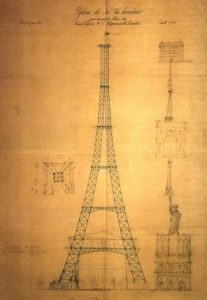
Image source:https://en.wikipedia.org/wiki/Gustave_Eiffel#/media/File:Maurice_koechlin_pylone.jpg
The impressive shape and strength of the materials make it weigh about 10,000 tons. For its maintenance, 50 tons of paint are needed every 7 years. Depending on the ambient temperature, the height of the tower can vary by several centimeters due to the expansion of the metal (up to 15 cm higher during the summer heat). On windy days, the top of the tower can oscillate up to 12 cm.
Designer: Gustave Eiffel
Year: 1889
Architect: Stephen Sauvestre
Structural engineer: Maurice Koechlin and Émile Nouguier
Main contractor: Compagnie des Éstablissements Eiffel
Material: wrought iron
Dimensions: H 325m x W 124,9m x L 124,9m
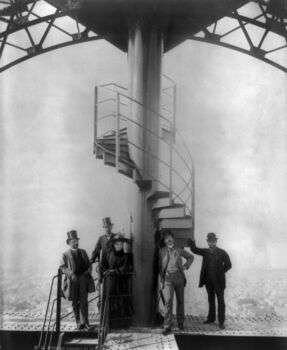
Image source: https://search.creativecommons.org/photos/e9b234a8-e5be-412d-88ca-994cf7f61dfa by trialsanderrors
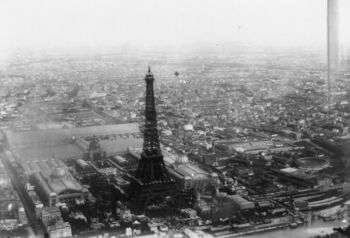
Image source: https://search.creativecommons.org/photos/0e47f483-63db-47d0-a949-f5707ecaacd2 by trialsanderrors
10 Interesting Facts
- During the German occupation, the tower closed to the public because the tower’s lift cables were cut by Nazi soldiers that tried to attach a swastika to the top. The flag was so large that it had to be changed with a smaller one just a few hours later.
2. It has been the world’s tallest man-made structure for 41 years until the realization of the Chrysler Building in NY in 1930.
3. Gustave Eiffel, designer and inventor of the Eiffel Tower, designed some interior elements of the Statue of Liberty in NY, including the internal frame.
4. About 60 tonnes of paint are needed every seven years for repainting the tower.
5. Between 1925 and 1934, Citroën, a French car manufacturer, used the tower for commercial purposes. The name of the brand appeared on the tower illuminated by thousands of light bulbs. It was considered one of the world’s biggest advertisements by the Guinness World Records.
6. All around the world, there are more than 30 replicas of the tower such as in Las Vegas, Texas, and China.
7. At the base of the tower, there are engraved names of 72 French scientists and international engineers.
8. At the top of the tower, it is possible to visit the private room of the Eiffel where the engineer used to admire the sunset.
9. The tower is called La Dame de Fer (the “Iron Lady”) by the French. This nickname is the same one with which Margaret Thatcher is known.
10. In the beginning, the Eiffel Tower was despised by citizens and artists who called it “the iron asparagus”, a nickname still in vogue among many Parisians.

Image source:https://en.wikipedia.org/wiki/Gustave_Eiffel#/media/File:Gustave_Eiffel_1910.jpg
Info sources:
